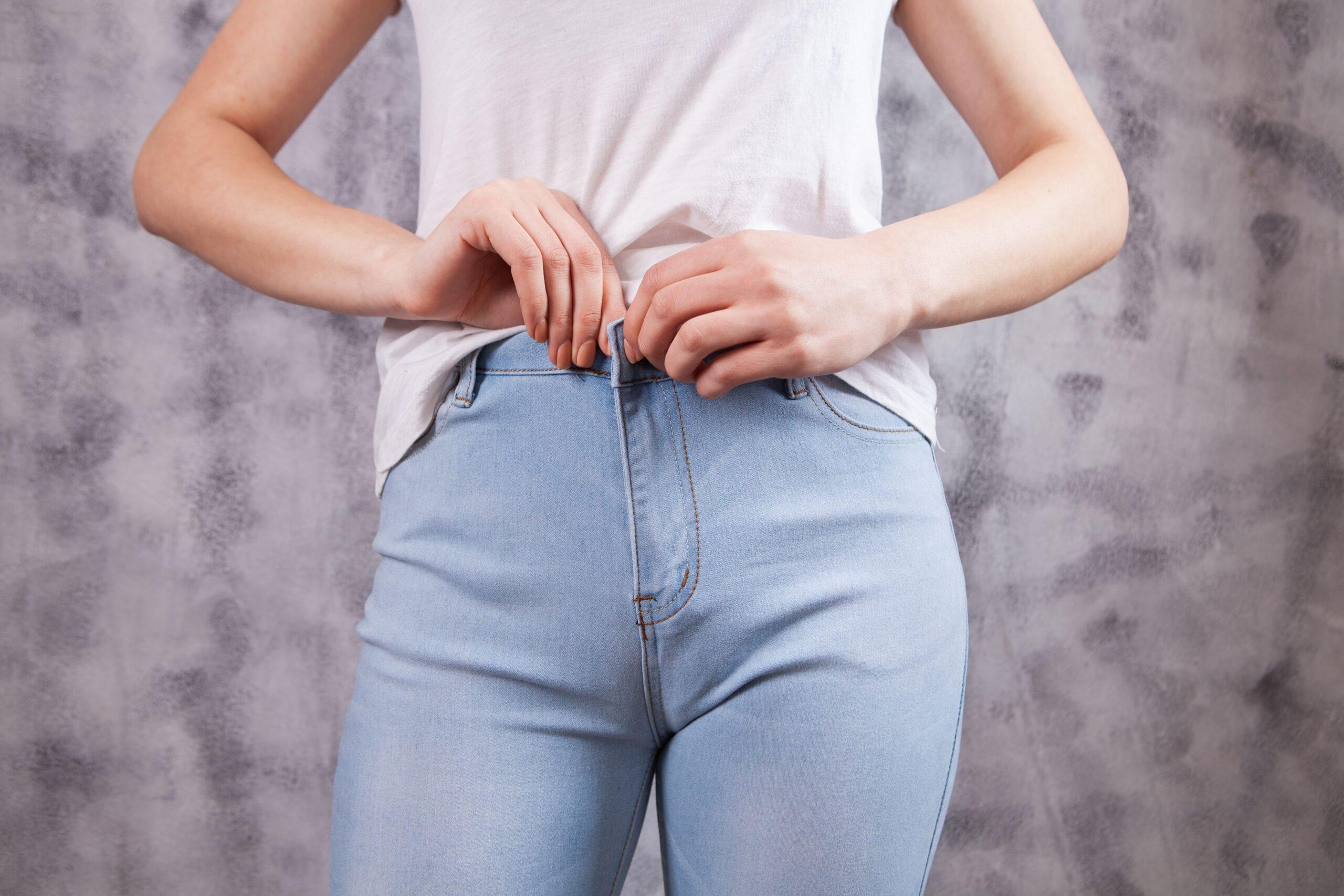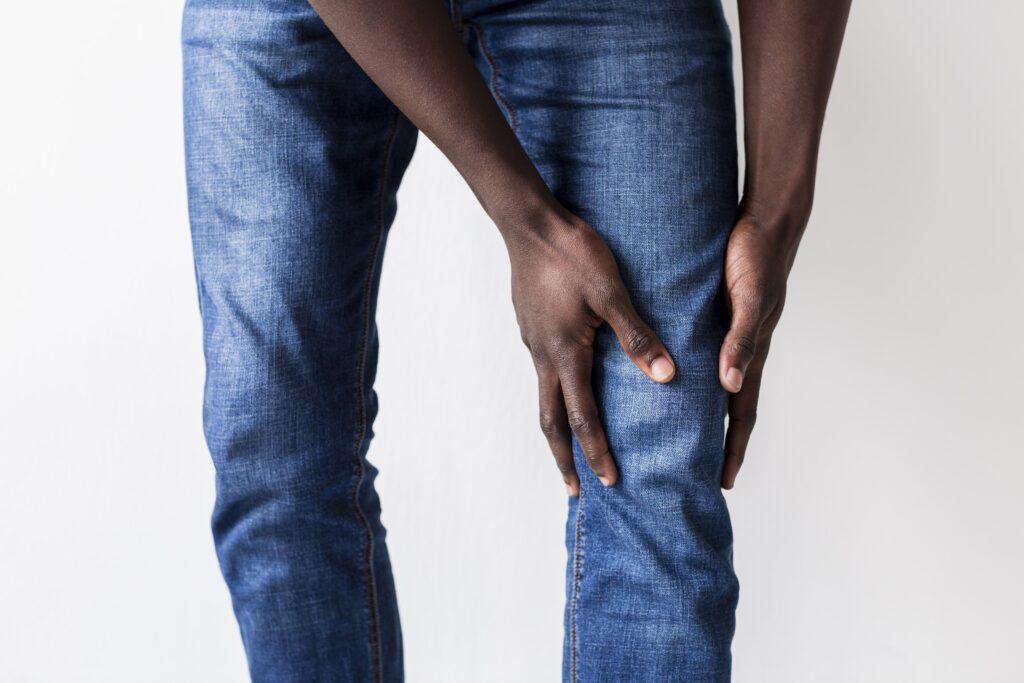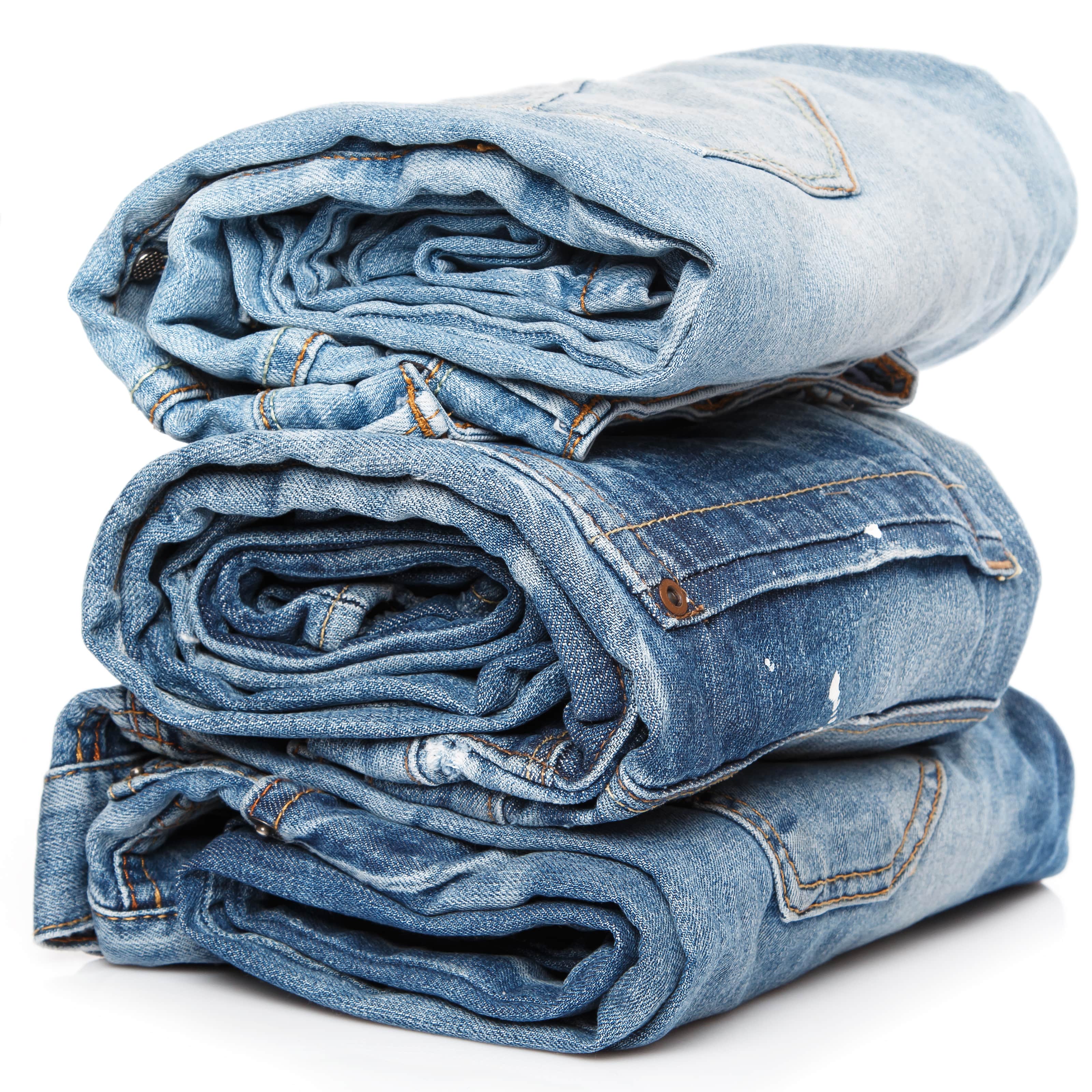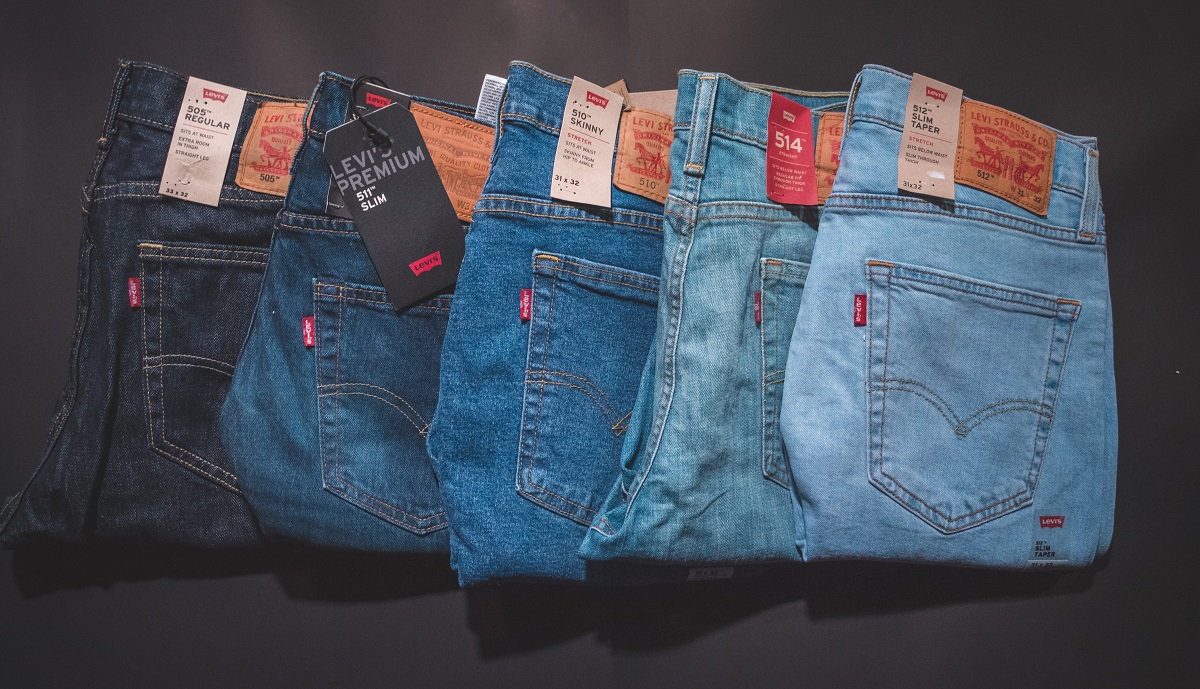So if you are like me that has been wondering why are my jeans suddenly tight or seemingly shrunken overnight or if there’s a scientific explanation for this frustrating phenomenon of unintentional weight gain, keep reading.
We’ll unravel the mysteries surrounding suddenly tight jeans and equip you with the answers necessary to overcome this wardrobe dilemma of rapid weight gain. Get ready to bid farewell to those confining pants and say hello to a more comfortable future in terms of weight loss!
Reasons Why Jeans Shrink in the Dryer and How to Stretch Them
Heat and Agitation: The Culprits Behind Shrinking Jeans
Jeans, our beloved go-to pants, can sometimes turn against us by suddenly feeling uncomfortably tight. One common reason for this unfortunate phenomenon is fluid retention combined with heat and agitation during the drying process.
When jeans are subjected to high temperatures in the dryer, the protein fibers contract, causing them to shrink. The constant tumbling and rubbing against other garments create friction that further contributes to this undesirable outcome.
To prevent such issues and promote weight loss, it is important to choose jeans made from breathable fabrics, increase fiber intake, and stay hydrated.
Hot Water: Another Enemy of Perfectly Fitting Jeans
While it may seem counterintuitive, washing your jeans in hot water can also lead to unintentional weight gain. Just as with heat from a dryer, exposing denim to high temperatures during a wash cycle can cause the fibers to constrict.
Therefore, if you’re aiming to maintain the current size of your jeans or prevent further shrinkage, opt for cold or lukewarm water when laundering them. This is especially important if you’re trying to manage weight loss and avoid fluid retention.
Techniques for Regaining Comfort: Stretching Your Way Out
If you find yourself experiencing unintentional weight gain and your jeans suddenly feel tight, fear not! There are several techniques you can employ to stretch them back into shape. This blog post will provide you with helpful tips on weight loss and snacking.
- Wearing Damp Jeans: Start by dampening your jeans using a spray bottle filled with water or by soaking them briefly before wearing. By doing so, you allow the fabric fibers to relax and become more pliable. Once dampened, put on your jeans and wear them until they dry naturally on your body.
- Using a Stretching Spray: Another option is utilizing specialized stretching sprays available on the market. These sprays work by softening the fabric fibers, making it easier for you to stretch out your jeans manually while they are still wet.
- Stretching Exercises: Perform simple stretching exercises while wearing your damp or freshly washed jeans to help loosen the fibers. Squats, lunges, and leg lifts can all aid in stretching out the material and providing a more comfortable fit.
Prevention is Key: Avoiding Shrinkage
Instead of finding yourself in a battle against shrinking jeans, take preventive measures to maintain their original size. In this blog post, we will discuss how to avoid fluid retention and find the sweet spot for maintaining your jeans’ fit.
- Lower Heat Settings: When using a dryer, opt for lower heat settings or even tumble-drying on air only. This reduces the risk of excessive heat causing shrinkage.
- Air-Drying: The safest way to dry your jeans is by letting them air-dry naturally. Lay them flat or hang them up, ensuring they are not exposed to direct sunlight or high heat sources like radiators.
- Spot Cleaning: Avoid unnecessary wash cycles by spot cleaning stains or dirt whenever possible. This reduces wear and tear on your jeans and minimizes exposure to conditions that could lead to shrinkage.
By understanding why jeans shrink in the dryer and implementing strategies for stretching them back into shape, you can bid farewell to the discomfort of unintentional weight gain and suddenly tight-fitting pants. Remember, prevention is always better than cure when it comes to preserving the sweet spot of your favorite denim companions!
Determining if Weight Gain is the Culprit Behind Tight Jeans
Assessing Recent Changes in Diet, Exercise, or Lifestyle
One of the most common reasons for suddenly tight-fitting jeans is weight gain in the sweet spot. If you’ve noticed that your jeans are feeling snug and uncomfortable, it’s worth considering whether changes in your body size could be the culprit.
Assessing recent changes in diet, exercise, or lifestyle can provide valuable insights into potential weight gain possibilities in the sweet spot.
Evaluating Your Diet
Weight gain often occurs when we consume more calories than our bodies need. Take a moment to reflect on your eating habits and consider if there have been any recent changes that could contribute to weight gain.
Have you been indulging in more sugary snacks or high-calorie meals? Are you eating larger portions than usual? These dietary factors can lead to an increase in body weight over time, as they push us away from our sweet spot of calorie balance.
Examining Your Exercise Routine
Regular physical activity plays a crucial role in finding the sweet spot for maintaining a healthy weight. Have you recently become less active or stopped exercising altogether?
Sedentary behavior can result in weight gain as fewer calories are burned throughout the day. Reflect on any changes in your exercise routine and determine if reduced physical activity may be contributing to tighter jeans.
Lifestyle Factors
Beyond diet and exercise, various lifestyle factors can influence our body size and finding the sweet spot is crucial. Consider if there have been any significant changes recently that could contribute to weight gain.
For example, stress and lack of sleep have both been linked to increased appetite and potential weight gain, which can throw off the sweet spot.
Certain medications or medical conditions may also impact our body’s ability to regulate weight and find the sweet spot.
Tracking Body Measurements for Insight
To find the sweet spot and determine if weight gain is causing your jeans to feel tight, tracking your body measurements, such as waist circumference and hip size, is essential. Regularly measuring these key areas allows you to monitor any changes over time.
Start by using a soft tape measure to measure around your waist at its narrowest point and around your hips at their widest point.
Note down these measurements and compare them to previous ones taken when your jeans fit comfortably. If you notice an increase in waist or hip size, it’s likely that weight gain is indeed the cause of your tight jeans.
Finding the sweet spot for your waist and hips measurements can help determine if weight gain is the culprit.
Consulting with a Healthcare Professional
If you’re unsure about the reasons behind your suddenly tight jeans or if you suspect that weight gain may be due to factors beyond diet and exercise, it’s essential to consult with a healthcare professional. They can provide accurate assessment and guidance based on your individual circumstances.
A healthcare professional will take into account various factors such as medical history, lifestyle choices, and potential underlying conditions that could contribute to weight gain. They may also recommend additional tests or assessments to rule out any other possible causes for the tightness in your jeans.
Remember, sudden weight gain can sometimes be attributed to bloating rather than actual fat accumulation. Bloating occurs when excess gas builds up in the digestive system, causing temporary distention and discomfort.
If you experience frequent bloating alongside tight-fitting jeans, discussing this symptom with a healthcare professional can help determine its cause and guide appropriate treatment options.
Signs to Look for: Is Weight Gain Causing Your Jeans to Feel Tighter?
Difficulty buttoning or zipping up your jeans could indicate weight gain as a factor.
Have you found yourself struggling to button or zip up your favorite pair of jeans lately? Well, it might be time to face the fact that those extra pounds you’ve been ignoring are catching up with you. Difficulty fastening your jeans is one of the telltale signs that weight gain is causing them to feel tighter.
You know that feeling when you have to suck in your stomach just to get those buttons aligned? Yeah, not fun at all. If you find yourself having trouble getting into your jeans without performing some sort of acrobatic maneuver, it’s probably time to consider whether weight gain is the culprit behind this newfound struggle.
Noticeable changes in waistline measurements suggest weight gain-related tightness.
Let’s talk numbers for a moment. If you’ve noticed a significant increase in your waistline measurements, chances are weight gain is responsible for your suddenly tight jeans.
Our bodies have a funny way of letting us know when we’ve put on a few extra pounds, and tightening waistbands are their way of saying, “Hey, maybe lay off the late-night snacks.”
So, grab a measuring tape and take note of any changes in your waist circumference. If there’s been an increase since the last time you wore those comfortable jeans with ease, then it’s clear that weight gain has contributed to their newfound snugness.
Feeling uncomfortable pressure around your midsection might be a sign of increased abdominal fat.
Do you ever experience an uncomfortable pressure around your midsection? It’s like someone decided to tighten a belt around your belly without warning! Well, guess what? That pressure might be due to increased abdominal fat caused by weight gain.
When we pack on the pounds, our bodies tend to store excess fat around our midsections. This not only affects the fit of our jeans but can also lead to discomfort and even health issues down the line.
So, if you’ve been feeling that extra pressure around your midsection, it’s time to acknowledge that weight gain is a likely culprit.
If you’ve recently gained weight, it’s likely that your jeans will feel tighter than before.
Now, let’s address the elephant in the room – weight gain itself. If you’ve recently noticed a few extra pounds on the scale, it’s no surprise that your jeans are feeling tighter than before.
Weight gain can happen for various reasons, such as changes in diet, lack of physical activity, or even certain medical conditions.
It’s essential to remember that weight gain doesn’t always happen overnight. Sometimes it sneaks up on us gradually until one day we realize our favorite pair of jeans just don’t fit like they used to.
So, if you’ve experienced rapid or unintentional weight gain recently, don’t be surprised if those once-comfortable jeans now feel snug and unforgiving.
Understanding Overnight Changes: Why Clothes May Feel Tight in the Morning
Retention of water overnight can lead to temporary bloating and tight clothes in the morning.
Ever wake up, put on your favorite pair of jeans, and suddenly find them uncomfortably tight? Don’t worry, you’re not alone. One possible reason for this phenomenon is unintentional weight gain. Throughout the day, our bodies naturally accumulate fluid, but during sleep, this fluid can become trapped and cause temporary bloating.
When we lie down at night, unintentional weight gain occurs as gravity no longer assists with fluid drainage. As a result, excess fluid may pool in certain areas of our body, such as the legs or abdomen.
This unintentional weight gain can make us feel puffy and cause clothes that fit perfectly the previous day to suddenly feel snug.
To alleviate this issue, there are a few things you can try:
- Stay hydrated throughout the day: Drinking plenty of water helps maintain a healthy balance of fluids in your body and reduces the likelihood of excessive water retention.
- Limit sodium intake before bed: Consuming salty foods before going to sleep can contribute to fluid retention. Opt for low-sodium options or avoid them altogether to prevent waking up feeling bloated.
- Engage in light exercise before bedtime: Gentle movements like stretching or taking a short walk can help stimulate circulation and reduce fluid buildup while you sleep.
Consuming salty foods before bed may contribute to fluid retention and morning tightness.
That late-night snack craving might be tempting, but indulging in salty treats could be contributing to your morning clothing conundrum. Foods high in sodium have a notorious reputation for causing water retention due to their ability to disrupt the balance of fluids within our bodies.
Sodium is an essential mineral that helps regulate various bodily functions. However, consuming excessive amounts can throw off this delicate equilibrium by causing cells throughout our body to retain more water than necessary. The result? That uncomfortable feeling of tight jeans in the morning.
To combat this issue, consider these alternatives:
- Go for low-sodium snacks: Instead of reaching for a bag of potato chips or pretzels, choose healthier options like fresh fruits or vegetables. These alternatives are not only lower in sodium but also provide valuable nutrients.
- Be mindful of hidden sources of sodium: Many processed foods, such as canned soups and condiments, contain high levels of sodium. Check food labels and choose low-sodium versions whenever possible.
- Experiment with flavor alternatives: Enhance your meals with herbs, spices, or citrus juices instead of relying solely on salt for flavor. This can help reduce your overall sodium intake without sacrificing taste.
Wearing constrictive sleepwear or sleeping positions that restrict movement might affect clothing fit upon waking up.
Your choice of sleepwear and sleeping position can have a surprising impact on how your clothes fit in the morning. Tight-fitting pajamas or undergarments can compress your body while you sleep, leading to temporary indentations and discomfort upon waking up.
Similarly, certain sleeping positions can restrict movement and cause pressure points that affect blood circulation.
Lifestyle Factors: Other Reasons Your Jeans May Feel Tight Overnight
If you’re wondering why your jeans suddenly feel tight, it’s not always about gaining weight or indulging in too many snacks. There are various lifestyle factors that can contribute to this uncomfortable sensation. Let’s explore some of the common causes:
Consuming a large meal before bed can cause temporary bloating and tightness in the morning.
Eating a heavy meal right before hitting the hay might seem like a good idea at the time, but it can wreak havoc on your waistline come morning.
When you consume a large amount of food before bedtime, your body has less time to digest it properly.
As a result, you may wake up feeling bloated and find that your jeans no longer fit as comfortably as they did the night before.
To avoid this issue, try to eat lighter meals in the evening and allow yourself ample time to digest before going to bed. Go for foods that are easier on your stomach, such as lean proteins, vegetables, and whole grains.
Consider incorporating some gentle movement after dinner, like taking a leisurely stroll around the neighborhood or doing some light stretching.
Digestive issues like gas or constipation can affect abdominal comfort and clothing fit.
Nobody likes talking about digestive problems, but they can have a significant impact on how your jeans fit. Excessive gas buildup or constipation can cause discomfort in your abdomen and make your pants feel tighter than usual.
To alleviate these issues, there are several steps you can take:
- Stay hydrated: Drinking plenty of water helps keep things moving smoothly through your digestive system.
- Increase fiber intake: Fiber-rich foods promote regular bowel movements and prevent constipation.
- Avoid trigger foods: Certain foods like beans, cabbage, onions, and carbonated beverages are known to cause gas.
- Consider over-the-counter remedies: If necessary, consult with a healthcare professional about using over-the-counter medications to relieve gas or constipation.
Hormonal fluctuations during menstruation may lead to water retention and temporary tightness.
Ladies, you can blame your hormones for those days when your jeans feel a bit snug. During menstruation, hormonal fluctuations can cause water retention in the body, leading to temporary bloating and tightness around the waistline.
While there’s no magic cure for this natural process, there are ways to manage the discomfort:
- Stay hydrated: Drinking plenty of water helps flush out excess fluids from your system.
- Reduce sodium intake: High-sodium foods can contribute to water retention, so try to limit your consumption.
- Gentle exercise: Engaging in light physical activity like walking or yoga can help alleviate bloating and improve circulation.
Tips and Tricks: How to Alleviate the Discomfort of Tight Jeans
Stretch them out with a hairdryer
If you find your jeans suddenly feeling tighter than usual, don’t fret! One quick and easy solution is to use a hairdryer on low heat while wearing your jeans. The gentle warmth from the dryer can help loosen the fabric and provide a bit of extra stretch.
Simply put on your jeans, aim the hairdryer at the tight areas, and move it around for a few minutes. Be sure to keep the dryer at a safe distance to avoid overheating or damaging the denim.
Reduce friction with baby powder or fabric softener sheets
Friction between your skin and tight jeans can make them even more uncomfortable. To combat this issue, try applying some baby powder to areas where your jeans are particularly snug.
The powder will create a smooth barrier that reduces friction and allows for easier wear. Alternatively, you can rub fabric softener sheets along the inside of your jeans before putting them on. This hack works wonders in making tight jeans slide on smoothly without any discomfort.
Go for looser-fitting styles or stretchy denim materials
Sometimes, no matter how much you try to stretch or reduce friction, certain pairs of jeans just won’t cooperate. In such cases, it might be worth considering looser-fitting styles or opting for denim made from stretchy materials.
Loose-fit jeans provide more room in all the right places and offer greater comfort throughout the day. Stretchy denim blends offer flexibility and freedom of movement without sacrificing style.
Maintain a healthy lifestyle to prevent weight-related tightness
One common reason for sudden tightness in jeans is weight gain. If you’ve noticed your favorite pair becoming less forgiving around the waistline, it’s time to evaluate your lifestyle choices.
Engaging in regular exercise not only helps maintain overall health but also prevents unwanted weight gain. Incorporate activities you enjoy, such as walking, jogging, or dancing, into your routine.
Alongside exercise, maintaining a balanced diet filled with nutritious foods will help you stay in control of your weight and prevent tightness in your jeans.
Embrace Comfort and Confidence with Well-Fitting Jeans
In conclusion, understanding why your jeans suddenly feel tight can help you find solutions to alleviate the discomfort. Shrinking in the dryer, weight gain, overnight changes, and lifestyle factors are all possible culprits behind this issue.
By identifying the root cause, you can take appropriate steps to address it.
If your jeans have shrunk due to dryer heat, consider stretching them using techniques like wetting and pulling or wearing them while damp. On the other hand, if weight gain is to blame for the snug fit, focus on maintaining a healthy lifestyle through exercise and balanced nutrition.
It’s important to pay attention to signs that indicate weight gain as a potential cause of tight jeans. These signs include changes in body measurements, difficulty buttoning or zipping up your pants, or feeling uncomfortable throughout the day.
Keep in mind that clothes may feel tighter in the morning due to temporary bloating or water retention. This is usually not a cause for concern unless accompanied by persistent discomfort or significant weight gain.
Various lifestyle factors can also contribute to sudden tightness in jeans. Factors such as diet choices (high sodium intake), lack of physical activity, hormonal fluctuations during menstrual cycles, or even certain medications may affect how your clothes fit.
To alleviate the discomfort of tight jeans, try some helpful tips and tricks. These include wearing looser-fitting clothing temporarily until you address the underlying issue causing tightness. Practicing mindful eating habits and staying active can promote overall well-being and maintain a comfortable fit for your jeans.
Remember that finding well-fitting jeans is essential for both comfort and confidence. When shopping for new pairs of denim, pay attention to size charts provided by brands and consider trying different styles that suit your body shape best.
By following these guidelines and taking care of yourself physically and mentally, you can embrace comfort and confidence with well-fitting jeans that make you feel great.
FAQs: Why Are My Jeans Suddenly Tight
Q: Can weight loss cause jeans to suddenly feel tight?
A: Yes, weight loss can lead to a change in body measurements, causing previously well-fitting jeans to feel tight. Consider reassessing your clothing size and trying on different styles that accommodate your new shape.
Q: Are there any quick fixes for tight jeans?
A: While there are temporary solutions like using a hair tie or elastic band to extend the waistline, it’s best to address the underlying issue causing the tightness rather than relying on quick fixes. Focus on maintaining a healthy lifestyle and finding jeans that fit properly.
Q: How often should I wash my jeans to avoid shrinkage?
A: Washing denim too frequently can contribute to shrinkage over time. To preserve their original size, consider washing your jeans inside out in cold water and air-drying them whenever possible.
Q: Can bloating make my jeans feel tighter?
A: Yes, temporary bloating caused by factors such as gas, menstrual cycles, or certain foods can make your clothes feel tighter. If you notice consistent discomfort due to bloating, consult with a healthcare professional for further evaluation.
Q: Are there specific exercises that can help alleviate tightness in the waist area?
A: Engaging in core-strengthening exercises like planks, side bends, or bicycle crunches may help tone and strengthen the abdominal muscles. However, it’s important to remember that spot reduction is not possible – overall weight management is key for long-term results.
Q: Should I buy one size up when purchasing jeans online?
A: It’s advisable to refer to the brand’s size chart before making a purchase online. Each brand may have slight variations in sizing, so taking accurate measurements and comparing them with the provided chart will ensure a better fit.
Q: Can alterations fix tight jeans?
A: Depending on the extent of the tightness, alterations may be a viable option to make jeans fit better. A professional tailor can assess the garment and suggest modifications such as letting out the seams or waistband to provide additional comfort.













